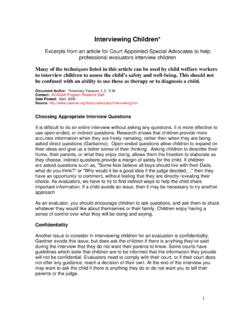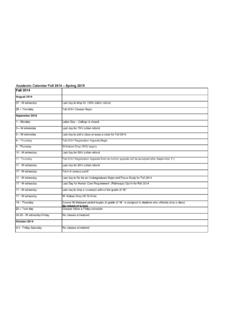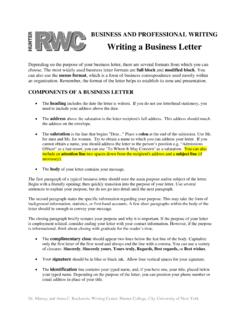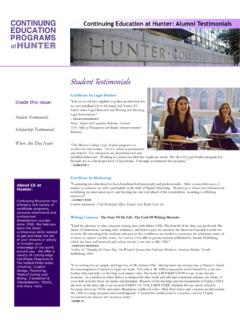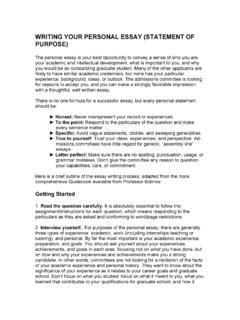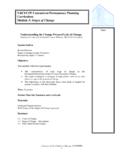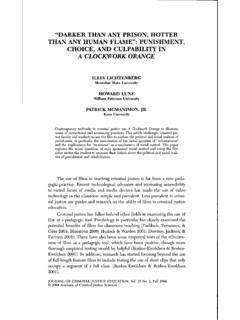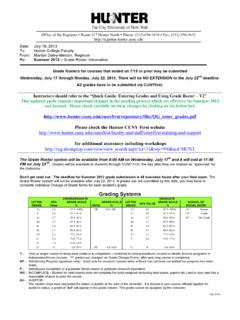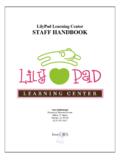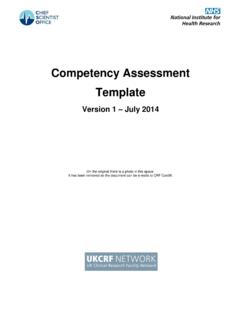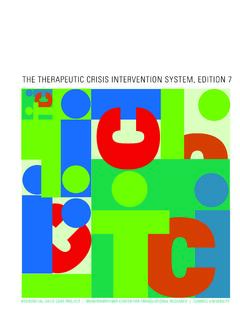Transcription of Early Adolescence (10 – 12 years old)
1 National Resource Center for Family-Centered Practice and Permanency Planning Hunter College School of Social Work 129 E. 79th Street New York, NY 10021 Tel. 212/452-7053 Fax. 212/452-7051 e-mail Early Adolescence (10 12 years old) Developmental Milestones: Physical Have increased coordination and strength Are developing body proportions similar to those of an adult May begin puberty evident sexual development, voice changes, and increased body odor are common. Emotional/Social Increased ability to interact with peers Increased ability to engage in competition Developing and testing values and beliefs that will guide present and future behaviors Has a strong group identity; increasingly defines self through peers Acquiring a sense of accomplishment based upon the achievement of greater physical strength and self-control Defines self-concept in part by success in school Intellectual/Cognitive Early adolescents have an increased ability to learn and apply skills.
2 The Early adolescent years mark the beginning of abstract thinking but revert to concrete thought under stress. Even though abstract thinking generally starts during this age period, preteens are still developing this method of reasoning and are not able to make all intellectual leaps, such as inferring a motive or reasoning hypothetically. Youth in this age range learn to extend their way of thinking beyond their personal experiences and knowledge and start to view the world outside of an absolute black-white/right-wrong perspective. Interpretative ability develops during the years of Early Adolescence , as does the ability to recognize cause and affect sequences. National Resource Center for Family-Centered Practice and Permanency Planning Hunter College School of Social Work 129 E. 79th Street New York, NY 10021 Tel. 212/452-7053 Fax.
3 212/452-7051 e-mail Early adolescents are able to answer who, what, where, and when questions, but still may have problems with why questions. Safety Checklist for Caregivers: 9 Who providers supervision for your child when you are not home? How do you know this person? How old is this person? Is there a way for your child to reach you when you are away from home? 9 How does your child get to and from school? 9 Do you know where your child is when s/he is not at school and away from home? Is there a way for your child to reach you when s/he is away from home? 9 Do you know who your child s friends are? 9 Does your child know your address and phone number? 9 Does your child know what to do if a stranger talks to him/her on the street? 9 Is there a list of phone numbers for your doctor, local hospital, police, fire department, poison control center and a friend or neighbor near the phone?
4 9 Does your child know what to do in case of an emergency? Does your child know where smoke alarms and carbon monoxide alarms are located in your home? 9 Did this child have any serious injuries, either before or since coming into your care? 9 Does your child have any chronic health conditions? Do you have the necessary medications, medical equipment, and medical staff support to adequately deal with this condition? 9 Do you have a First Aid Kit in your home? Does your child know where it is and how to use it? 9 Are there child safety window guards on all windows above the first floor? National Resource Center for Family-Centered Practice and Permanency Planning Hunter College School of Social Work 129 E. 79th Street New York, NY 10021 Tel. 212/452-7053 Fax. 212/452-7051 e-mail 9 Does your child wear safety gear, including a helmet, for activities such as cycling, in-line skating, skateboarding or riding a scooter?
5 Safety Checklist for Youth: 9 Who takes care of you when _____(caregiver s name) is not at home? How do you feel about staying with this person? Do you know how to reach _____(caregiver s name) when they are away from home? 9 Do you know what to do in case of an emergency, like a fire? Can you tell me what you would do? 9 Do you know where the first aid kit is kept? Do you know how to use the different items in it? 9 Are you ever left alone without any grown ups around? What is this like for you? 9 Do you ever stay over at someone else s house? How often do you do this? Do you like this? 9 How do you get to and from school? 9 Do any adult s provide supervision for you when you play outdoors? Does _____(caregiver s name) know where you are when you are away from home and not at school? 9 Do you know what to do if a stranger talks to you on the street or asks you to go somewhere with him or her?
6 Well-Being Questions for Caregivers: What is it like for you to care for this child? What has been the effect on your family of having this child placed here? What did you expect it to be like? Describe who this young person is: What about the _____ (youth s name) is easiest and most pleasurable? What is the most difficult aspect of caring for _____ (youth s name)? What are the things about _____ (youth s name) this that will help him/her in the future? What will be hard for him/her? National Resource Center for Family-Centered Practice and Permanency Planning Hunter College School of Social Work 129 E. 79th Street New York, NY 10021 Tel. 212/452-7053 Fax. 212/452-7051 e-mail How has _____ (youth s name)changed since coming here? What do you think about that? How has _____ (youth s name) adjusted to this placement? What are the goals for _____ (youth s name) and his/her family and what do you think/feel about that?
7 What makes that okay; not okay? What do you think of the family visits with _____ (youth s name)? What are the services _____ (youth s name) is receiving? What do you think/feel about those? What do you think that they met his/her needs? What things does _____ (youth s name) like to do? To whom do you go if things aren t going too well? What are the things you need to support your continued care of this child? Well-Being Questions for Early Adolescents: Living Arrangements: How is it for you living at _____ s house? Who else lives here with you? What do you think about these other people who live here? What is it like living with them? Do you know why you are living here with _____(caregiver s name)? How do you feel about _____(caregiver s name)? How do you think that they feel about you? Are there things that you can and can t do at _____ s house?
8 What are some of these rules? What happens if you break a rule? How often does this happen? Daily Routine: How do you wake up in the morning? What do you do in the morning to get ready for school? Does anyone make breakfast for you? Who? What are some things that you eat for breakfast? Do you bring lunch with you to school or do you get lunch at the school cafeteria? What are some things that you eat for lunch? Who makes you dinner? What are some things that you eat for dinner? What do you do after dinner? What time do you go to bed? National Resource Center for Family-Centered Practice and Permanency Planning Hunter College School of Social Work 129 E. 79th Street New York, NY 10021 Tel. 212/452-7053 Fax. 212/452-7051 e-mail Where do you sleep? Do you share a room with anyone? Who? What is this like for you? Social/Emotional: If you are upset or angry about something that happens at _____ s house, is there anyone that you can go to?
9 Who? What happens when _____(caregiver s names) get angry at you, each other, or someone else who lives in your house? How often do they get angry? What does it feel like for you when they are angry? What are some of the things that they get angry about? Is there anyone at _____ s house or anywhere else that you go who makes you feel scared? Are there any adults or kids who do things that make you feel sad, mad, scared or confused? Do you ever wake up in the middle of the night? If so, what happens? Do you ever get scared hanging out in your neighborhood? If so, what are the things that make you scared? Is there anyone who you are able to talk to about this? If something is really worrying you, who can you talk to? If you need to get in touch with me, do you know how to do that? How? Family and Friends: How are visits with your family? What kinds of things do you with your family on visits?
10 How often do you see them? Do you speak with them on the telephone in between visits? Do you see your brothers and/or sisters? How is to see them? Do you see other members of your family , grandparents, aunts, uncles? Who are your friends? What do you like to do with them? Where do you see them? Special Interests: What kinds of things do you like to do for fun (sports, music, art, video games, etc.)? Do you do these things while you are living with _____? Are there any things that you d really like to be doing that you aren t doing now? National Resource Center for Family-Centered Practice and Permanency Planning Hunter College School of Social Work 129 E. 79th Street New York, NY 10021 Tel. 212/452-7053 Fax. 212/452-7051 e-mail What do you do on the weekends? Who do you do this with? What do the other people in _____ s house do? If applicable: Is this different from what you used to do on weekends?
